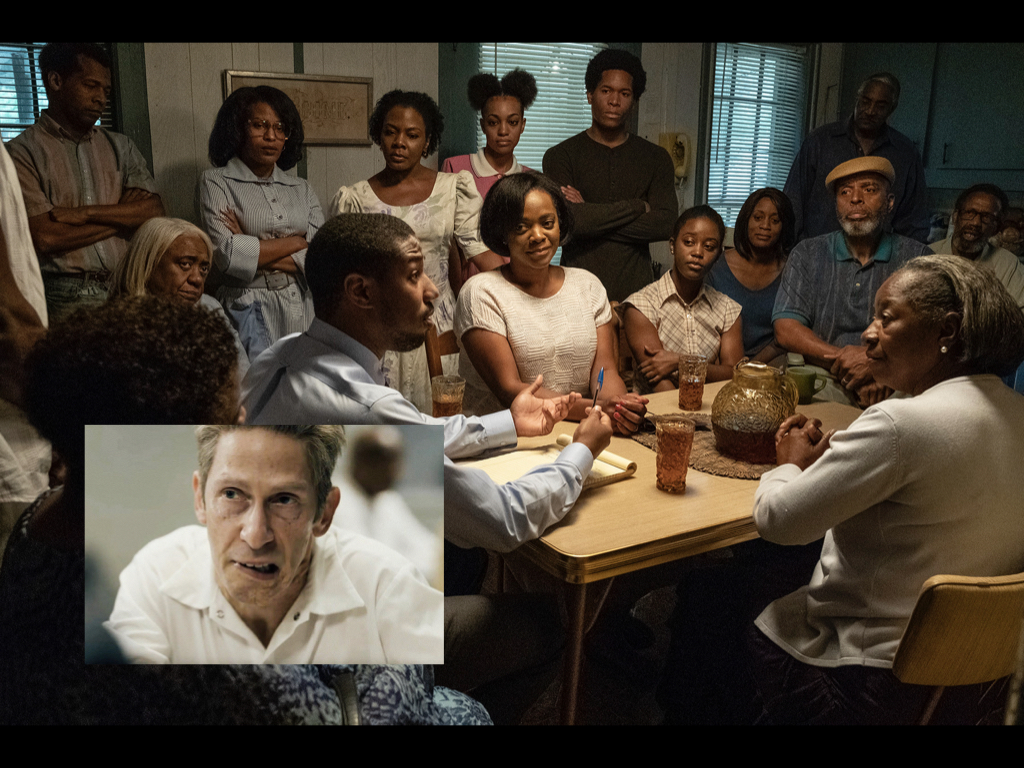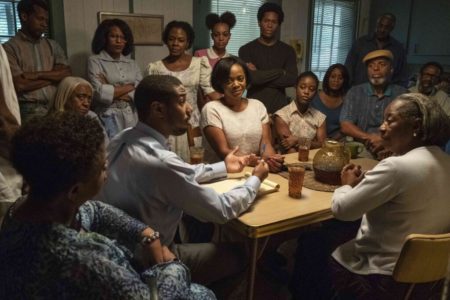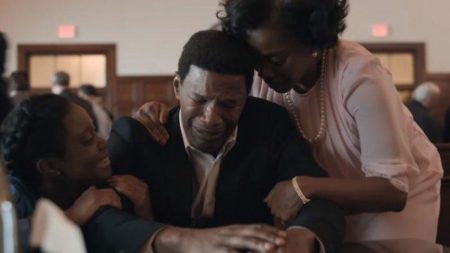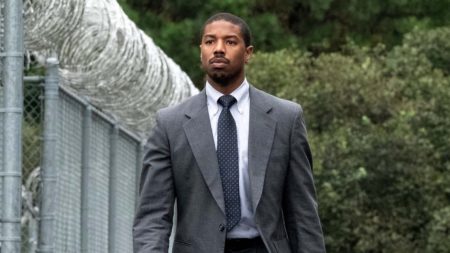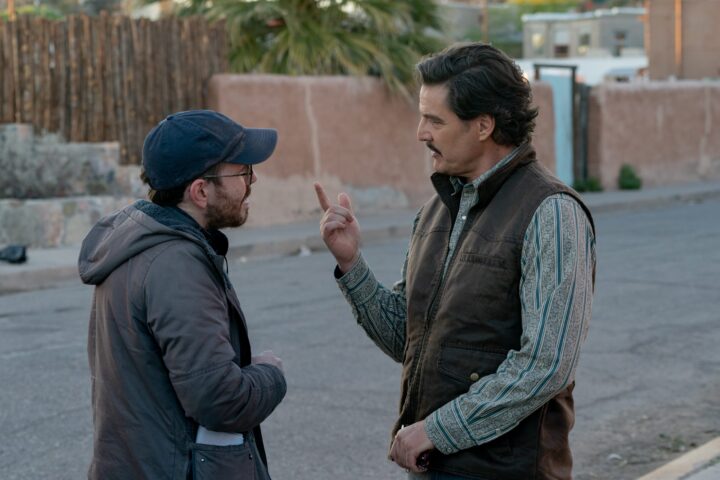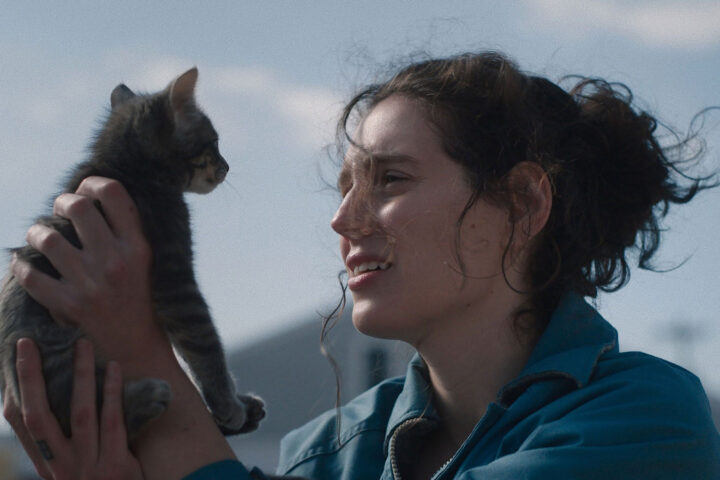In Just Mercy, young, Harvard-educated attorney Bryan Stevenson (Michael B. Jordan) eschews a big law firm career in favor of starting a life-changing Alabama organization dedicated to exonerating wrongly accused death row inmates. It’s a strong, thoughtful and moving drama with as good an ensemble onscreen in any movie this year.
Actors Karan Kendrick and Tim Blake Nelson give two of the picture’s most vivid performances as real-life players who figure prominently in the tenuous life of accused inmate Walter McMillan (Jamie Foxx), both elevating their supporting turns into expert character-actor performances. One says volumes with her uncanny underplaying and ability to wordlessly hold the camera; the other burrows deeply into a character whose exaggerations masking secrets. One shows her honesty in every difficult compromise. The other, a perjurer, must be broken down to get to the truth.
I recently caught up with actress Karan Kendrick, who plays Walter’s long-suffering and long supportive wife, Minnie, and playwright and actor Tim Blake Nelson, character actor extraordinaire who plays an unreliable witness named Ralph Myers, who may hold the key to McMillan’s exoneration.
The powerful onscreen pair stopped in Chicago to chat about director Destin Daniel Cretton’s Just Mercy, their collaboration with a career-high Jordan and some incisive perspectives on how, and why, they do what they do—acting, and their love for it.
Karan, I really appreciated your work in the film as Minnie McMillan. You give us a person who has undergone a deeply challenging crisis—having her husband wrongly convicted and on death row—and then you reveal additional challenges and deep, committed resolve. I believed it. Can you share a bit about the process of depicting her life onscreen?
Karan Kendrick: I had heard of Bryan Stevenson and knew of the memorial and there is a marker in my hometown. But I did not know the Equal Justice Initiative and their work, which is just mind-blowing. My introduction to the piece was through Minnie McMillan herself; an image of her and a link to a video. And I immediately connected with this woman who was the embodiment of the women who raised me. I had never seen them in a film in this way. For me, that was the beginning of the journey. And then I think they did a wonderful job of creating a life for her on the page.
Then in reading the book I was able to really uncover more of her story and to understand her. I read it, and then I read it again. And then I read it again. I made notes to understand her journey. For me, one of the biggest questions to answer what her connection to him was. I think it was her children, but there was more. And I needed to get close to and support that place.
I think in life everybody has something going on that you just may not know about. And for Minnie, while there was much of her story on the page, there was also a part of it that was not. As a woman, she is not someone who shares everything with people, but it’s still in there. So as an actor I needed to dig deeper to try to understand those things for her and to covey them.
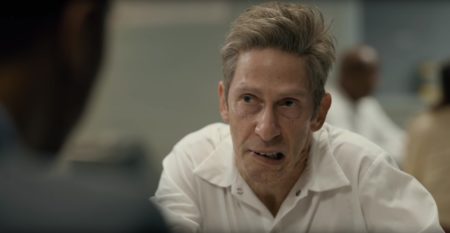
There is a great line where Bryan explains to Jamie Foxx’s Walter that your character, his wife, is standing by him because ‘she knows you’re innocent.’
Right. And I think his infidelities pale in comparison to that. You don’t kill someone because of infidelities. You may want to! But you don’t stand by their murder because they made bad choices. In his work, Bryan has said that if someone steals something, they are not just a thief. It’s a part of someone but not their totality. We are not defined by the worst things that we have done. So she accepts his humanity and all of who he is.
Tim, you’re playing a deeply conflicted, troubled person who maybe, in a way, needs to be set free himself by telling the truth. Sometimes you’ve been called a character actor. This is deep into that realm. I’ve been seeing you in the movies for decades now, but this time I almost couldn’t see you in this movie. You are very far in. Of course, some of that is the physical construction of the character. But I thought as an actor you went to a place way down there.
Tim Blake Nelson: I suppose I did. This is physically one of the more difficult roles I’ve been offered. And I was excited by that challenge. It was what I would call a ‘seepage’ role in terms of taking a very slow approach to finding the guy, and luckily with Destin I had the time to because I was offered the role over a month out, and allowed to come down early, which I now do (for most roles). I don’t anymore like to show up any later than a week before I shoot because I am usually playing characters who are involved in some level of transformation. It seems to be happening more and more and I don’t want to rush that process. So luckily, I just had the time on this one to make choices so that there were as many choices as possible.
Sometimes when you read a part, you say to yourself, ‘Oh, I know how to do this.’ You are wrong. Because it’s just not that kind of a process ultimately. It just isn’t. Your instincts can get you so far, but then if that is all you are doing the characters are going to meld into one another over the decades, because you are always going to be going from what first pops into your mind rather than allowing the character to take you over. And if you allow a character to take you over in a patient way, the embodiment is going to be of you but completely different from you at the same time. That is what I was going for with Ralph Myers. And I think that is what the project demanded; not just of me but of all of us.
When you look at Karan’s performance, look at how Destin gives her the time to live inside of moments, and even how in his editing he allows shots to remain on actors and have those ineffable moments of experiencing something as it is happening. Part of her performance that I really love is when she is at the table with her family and somebody brings up her husband’s infidelity, and how she has to allow that. The camera is just on Karan, and she doesn’t look over at the person and she doesn’t really look at Bryan, but she is effectively inside herself.
And I knew from the moment that Destin offered me this part, and I had spoken with him and read his script, that this was going to be one of those projects that was going to allow for those moments to happen and it was not going to be, as you alluded to earlier, some sort of mawkish, sentimental issue-oriented film. That it was above all going to be a film that was sympathetic to the flawed human experience as it is manifested in our seemingly insatiable desire in this county to kill those whom we find repugnant, rather than rehabilitate them, or even, God forbid, sympathize with their predicament.
When you guys see the movie now, aren’t you fascinated by the details of the death row culture that the movie creates? By their relationships? I don’t think I’ve seen that so intimately done before.
KK: I think it’s a very human picture. These are people having a shared experience and working together to ensure that shared experience is most sustainable given the circumstances. I don’t think I’ve seen that before either.
TBN: Destin has the temerity in this movie to defy expectations in those scenes, because you never are allowed to see those three guys—in those wonderful performances by Jamie and O’Shea and Rob—as hardened psychopaths. And that is what we want to see, because that will let us off the hook. Destin says, ‘I’m not giving you that. That is not what this movie is. So proleptically I am not going to do that even to take an argument away. Go ahead say that I am misconstruing these characters. I don’t care. I am going to humanize them.’ And that stems from Bryan Stevenson, wouldn’t you say?
KK: Absolutely. I think that’s the work that Bryan does.
Speaking of Bryan and Michael’s performance in the movie, when I think of Michael, I always think of somebody who is confident and has a lot of energy. When you see him in a Marvel movie or one of the Creed pictures, you can’t take your eyes off him because he is magnetic. He has an alpha-male energy that can drive a movie. But in this movie, I felt the opposite. I was ready for it because I think the character, as we begin the movie, is ripe for that sort of persona he can frequently bring. But I was really surprised, I guess, at the maturity and stillness in him here. He must do a lot of listening and learning from both of you and others. What were your reactions working opposite him?
KK: You’ve worked with twice; more than I have.
TBN: Twice. Well, yes but you’re not off the hook here (laughter). So this is my second time working with Michael and I’ve said this before, but it bears repeating: I think two classiest people now doing this are Michael and Regina King. Both started really young and both delivered extraordinary performances while they were still young. They both enjoyed a level of success in this industry that usually destroys people and it has not destroyed them. They are now both adult professionals in full stride in their careers. And they have not been marred in the perceptible least by early success. They just get better and better!
On The Wire, Michael, that young, pulling off that performance with such instinctive, natural, delicate sympathy inside of the part, with so many forces working against him from so many different directions all the way until his character is shot—the most devastating moment, I think, in that entire series—and he accomplished that at thirteen?
Regina, similarly, came in at and stated working professionally at age twelve, and now they are both titans. Would you know it just from hanging out with them and talking to them? No! They are just the most generous, decent people. And Michael was our leader under Destin. Destin was the leader and it is his movie. But Michael produced it and as a scene partner, he channels Bryan Stevenson. He really does. We have spent a lot of time with Bryan and he channels that guy in his performance, which is simple, honest, deep, and full of grace.
KK: Michael is a dream. What struck me most was how he could walk in these parallel universes, so he was at once operating with the strength of a producer with the presence of mind to connect in that way, and then also portray the vulnerability of Bryan. To watch him do that—to be very present in both of those in the most excellent ways—while this was my first time working with him, he was just incredible. He helped us set the tone, along with Destin, for a very safe, collaborative, respectful space. I would not even know what else to ask for; I just wouldn’t. He was great.
What’s the best part about your jobs?
KK: Everything! Like getting to do this!
Other than press tours!
KK: Travel can sometimes wear you down a bit! From a place of gratitude, let me just stop and consider what is in front of me. To sit next to (Tim) and listen- I just want to listen to what he is saying! I learn so much just by listening and being in the room and understanding- or having things articulated in a way that I may have felt but I did not have the words to say in such a way. To watch Bryan Stevenson up close and listen to him share his story. To see through Michael’s actions what is possible for actors and now content creators. To learn from Destin that you can do this and still be human and kind and tell great stories and have a family and love them and treat people well. All these things! This experience is an embarrassment of riches—to be able to share the story of a woman I never met but absolutely love because she represents love in terms of the women who raised me in my life. I don’t even know what else!
TBN: Why do we like stories? I think that stories are rehearsals for life.
KK: See what I mean?
TBS: And as an audience, we empathize- I mean there are now studies about mirror neurons, as they call them, where we are actually empathizing with characters up on the screen, living through experiences. That is why we are drawn to stories. Getting to be the actors inside of those stories is a deeper version of that, so every time I get to play a character I feel like I am deepening my understanding of what it is to live a life. I feel incredibly blessed to get to do that. And to get to do that among other people like Karan and the rest of our cast who are doing it at such unbelievably high levels, bringing their own experiences—that I could never bring—and getting to be a part of that while I am living my own, inside of a story, is a great way to live a life. And I feel privileged to get to get do it.
